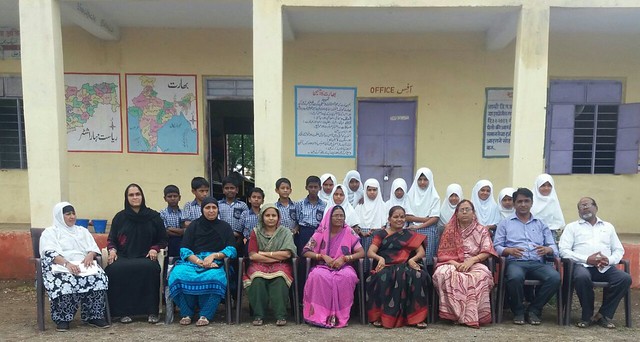By Imran Inamdar for TwoCircles.net
Solapur: A week ago, Twocircles.net had written about a workshop for Urdu medium school teachers in Solapur to highlight the dismal state of education in these schools, and how even teachers were not aware of the basic foundations of the language; let alone teaching them to children.
Simply put, the story did not cover the Urdu teachers in glory. However, using the workshop as an excuse to blame all teachers would not only be wrong, it would also be detrimental in improving the quality of education in these schools.
And seven teachers of a Zilla Parishad Urdu primary school: Kumbhari Nizamuddin Chitapure ,Mahmud Nawaz, Sabiha Siddiqui, Khurshid Irkal, Raziya Sayed, Amira Peerzade, Khatun Gazi and shamim Shaikh knew this as early as 2013, and decided to do something about it. The result? By January 2014, the group had started the first, and still the only pre-primary centre in Urdu medium schools for children in Urdu schools in Maharashtra under the age of five.

Two and a half years later, Mahmud Nawaz, one of the teachers and the brainchild behind the idea, tells Twocircles.net that this has been one of the best things to have happened to Urdu schools in the region. “I joined the school in 2007, and would often notice that a number of children, mostly as young three or four would accompany their elder siblings to school. They would sit with them, or play around the school courtyard, until they took admissions in Class 1. I wasn’t, and still am not, convinced that kids should directly be enrolled into Class One. A pre-primary set-up is essential even more in these cases since they receive little school education at home,” he says.
So, in January 2014, Nawaz and Nizamuddin Chitapure decided to take matters in their own hands, and soon, the other five teachers also signed up. Finding space for these classes was thankfully, not much of an issue because of a ‘construction miscalculation’ in the school building. “The school building had an extra room because of some mistake by the contractor. He had to show that the assigned area was completely built up, so he just added an extra class to the building, which was being used as a small library,” says Nawaz, smiling over the phone. “If that mistake hadn’t been committed, it would have been a little more difficult,” he says.
So, within weeks of discussing the plans, the teachers set up a mini classroom and started enrolling kids below the age of 5. “We started with 18 kids and planned the entire syllabus ourselves. We bought books from the markets for these kids, and also focussed on introducing them to English alphabets. We also got them uniforms; along with basic stationery,” says Nawaz.
The teachers also decided to get the help of a local person, Yasmin Nada, who helped them teach the young kids, especially when the teachers were busy with other classes. “We started by paying him about Rs 500 per month but now, thanks to Allah, we can pay him about Rs 1,200 per month,” says Nawaz. The seven teachers spend about Rs 25,000 a year on this school, but Nawaz says this is not an issue. “We take pride in the money we spend, for the betterment of the school’s children,” he adds.
The centre soon started attracting parents also, who had hitherto been unaware of the need for pre-primary education. “When they saw that this was tremendously helping the children, they were also encouraged to send their kids,” says Nawaz, adding that since its inception, the strength has gone up from 18 to close to 45 now, and is expected to increase in the coming years.
Seniors, peers laud the initiative
Vidi Gharkul lies on the outskirts of Solapur and mainly inhabited by Bidi workers, who send their kids to government schools. According to Nawaz, the absence of good and effective pre-primary school is a big lacuna in the educational system of the country. “Although the Balwadis (children centre) and Anganwadis are supposed to be fill these gaps, our area has neither of these and as a result, most children end up feeling intimidated when they directly enter school. Because of this pre-primary centre, we now have kids who have more than a basic understanding of Urdu, and can even recite a few English poems, along with understanding and using alphabets. It might seem like a small thing, but it goes a long way in helping them get into the schooling system,” Nawaz says, adding, “Although the pre-primary classes are not official (schooling system starts at Class 1) we see that almost all the kids who come for these classes get enrolled by their parents in Class 1 also. It is a good feeder system.”
The efforts of the teachers has been acknowledged by their peers and seniors. Athar Parvez dafedar, extension officer for Urdu schools, lamented on the fact that there is no provision of pre-primary school in Zilla Parishad . “These teachers are doing a fantastic job. It is really a model for other schools to implement and follow,” he told Twocircles.net.
Noor jahan Mulla, the current headmaster of the school, said that this initiative was an important step towards enhancing the quality of education. “Children are learning basic reading and writing skills in pre-schools and it is helping the teachers also in imparting good education. I thank the staff for such a commendable initiative,” he added.
Related:

